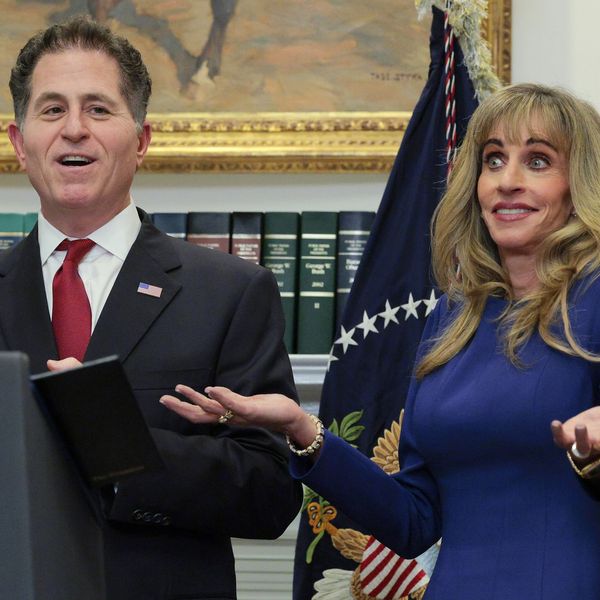When a Tax on the Rich Is Actually a Tax on the Rich
Meet the Press hosted what David Gregory dubbed a "special economic roundtable" on December 2 that included "CNBC's dynamic duo," https://www.fair.org/blog/2008/10/01/wall-street-is-main-street-people
Meet the Press hosted what David Gregory dubbed a "special economic roundtable" on December 2 that included "CNBC's dynamic duo," Maria Bartiromo and Jim Cramer. But Bartiromo's comments about tax increases for the wealthy needed a factcheck.

She started by making a familiar conservative point about the so-called "fiscal cliff"- that the White House talks about ending tax cuts for the wealthy, but will not talk about spending cuts:
And the fact is that I find it extraordinary that we are zeroing in on this discussion only about taxes, and we do not have this kind of elaborate discussion when it comes to spending cuts. Two points here. Number one, Americans realized that the three biggest drivers of our debt are Medicare, Medicaid and Social Security. We need structural change. We haven't heard that.
Let's step in here for a second: When did Americans "realize" any of this? When they're asked, thev tend to oppose cuts to these programs by substantial margins. There was an election last month; surely voters could have sent a message about their desire to cut these programs.
She went on:
Number two, on taxes, you really can't put all of the taxes into one category. Dividend taxes, for one, is probably the biggest threat to the markets and the economy right now, when you're just looking at taxes. And dividend taxes are not a rich tax, nor are capital gains. You're talking about pension funds, 401(k) plans, investments in companies that pay dividends. If you're expecting a dividend tax to go from 15 percent to 44 percent, that completely removes the opportunity or the incentive to buy dividend-paying companies. And that's going to hurt not just the rich. That's going to hurt everybody if, in fact, we were to see that. That's very dangerous, and it is going to create a massive selloff.
For starters, income from 401(k) retirement accounts is taxed as normal income when funds are withdrawn from those accounts, so it is hard to see how that would be relevant. It has been, however, a popular media talking point in discussions like this-like when then-CNBC host Erin Burnett declared that a capital gains rate cut meant that "the half of Americans that own stocks get a benefit there as well.")
The truth is that tax breaks on dividends and capital gains are most certainly a "rich tax." This chart from the Citizens for Tax Justice shows that the overwhelming share of these tax breaks goes to the top 1 percent:
Or consider this chart from the Center on Budget & Policy Priorities:
The attempt to portray tax hikes on the wealthy as something else is mostly a misdirection; as the New York Times reported today (12/3/12):
Many economists agree than an increasing proportion of the entire equities market is now held by retirement investors whose holdings are not subject to current tax law; by foreign investors who don't pay American taxes, or by institutional investors like insurance companies and pension funds that are exempt from taxes.
Or, to put it another way: According to the Congressional Research Service, the most significant contributor to the growth in inequality from 1996 to 2006 was dividends and capital gains. That income has enjoyed a massive break over the past dozen years.
If it's important to have an "economic roundtable," then Meet the Press should book a guest who might challenge these very familiar, very misleading talking points-or find a host who can do the same.
An Urgent Message From Our Co-Founder
Dear Common Dreams reader, The U.S. is on a fast track to authoritarianism like nothing I've ever seen. Meanwhile, corporate news outlets are utterly capitulating to Trump, twisting their coverage to avoid drawing his ire while lining up to stuff cash in his pockets. That's why I believe that Common Dreams is doing the best and most consequential reporting that we've ever done. Our small but mighty team is a progressive reporting powerhouse, covering the news every day that the corporate media never will. Our mission has always been simple: To inform. To inspire. And to ignite change for the common good. Now here's the key piece that I want all our readers to understand: None of this would be possible without your financial support. That's not just some fundraising cliche. It's the absolute and literal truth. We don't accept corporate advertising and never will. We don't have a paywall because we don't think people should be blocked from critical news based on their ability to pay. Everything we do is funded by the donations of readers like you. Will you donate now to help power the nonprofit, independent reporting of Common Dreams? Thank you for being a vital member of our community. Together, we can keep independent journalism alive when it’s needed most. - Craig Brown, Co-founder |
Meet the Press hosted what David Gregory dubbed a "special economic roundtable" on December 2 that included "CNBC's dynamic duo," Maria Bartiromo and Jim Cramer. But Bartiromo's comments about tax increases for the wealthy needed a factcheck.

She started by making a familiar conservative point about the so-called "fiscal cliff"- that the White House talks about ending tax cuts for the wealthy, but will not talk about spending cuts:
And the fact is that I find it extraordinary that we are zeroing in on this discussion only about taxes, and we do not have this kind of elaborate discussion when it comes to spending cuts. Two points here. Number one, Americans realized that the three biggest drivers of our debt are Medicare, Medicaid and Social Security. We need structural change. We haven't heard that.
Let's step in here for a second: When did Americans "realize" any of this? When they're asked, thev tend to oppose cuts to these programs by substantial margins. There was an election last month; surely voters could have sent a message about their desire to cut these programs.
She went on:
Number two, on taxes, you really can't put all of the taxes into one category. Dividend taxes, for one, is probably the biggest threat to the markets and the economy right now, when you're just looking at taxes. And dividend taxes are not a rich tax, nor are capital gains. You're talking about pension funds, 401(k) plans, investments in companies that pay dividends. If you're expecting a dividend tax to go from 15 percent to 44 percent, that completely removes the opportunity or the incentive to buy dividend-paying companies. And that's going to hurt not just the rich. That's going to hurt everybody if, in fact, we were to see that. That's very dangerous, and it is going to create a massive selloff.
For starters, income from 401(k) retirement accounts is taxed as normal income when funds are withdrawn from those accounts, so it is hard to see how that would be relevant. It has been, however, a popular media talking point in discussions like this-like when then-CNBC host Erin Burnett declared that a capital gains rate cut meant that "the half of Americans that own stocks get a benefit there as well.")
The truth is that tax breaks on dividends and capital gains are most certainly a "rich tax." This chart from the Citizens for Tax Justice shows that the overwhelming share of these tax breaks goes to the top 1 percent:
Or consider this chart from the Center on Budget & Policy Priorities:
The attempt to portray tax hikes on the wealthy as something else is mostly a misdirection; as the New York Times reported today (12/3/12):
Many economists agree than an increasing proportion of the entire equities market is now held by retirement investors whose holdings are not subject to current tax law; by foreign investors who don't pay American taxes, or by institutional investors like insurance companies and pension funds that are exempt from taxes.
Or, to put it another way: According to the Congressional Research Service, the most significant contributor to the growth in inequality from 1996 to 2006 was dividends and capital gains. That income has enjoyed a massive break over the past dozen years.
If it's important to have an "economic roundtable," then Meet the Press should book a guest who might challenge these very familiar, very misleading talking points-or find a host who can do the same.
Meet the Press hosted what David Gregory dubbed a "special economic roundtable" on December 2 that included "CNBC's dynamic duo," Maria Bartiromo and Jim Cramer. But Bartiromo's comments about tax increases for the wealthy needed a factcheck.

She started by making a familiar conservative point about the so-called "fiscal cliff"- that the White House talks about ending tax cuts for the wealthy, but will not talk about spending cuts:
And the fact is that I find it extraordinary that we are zeroing in on this discussion only about taxes, and we do not have this kind of elaborate discussion when it comes to spending cuts. Two points here. Number one, Americans realized that the three biggest drivers of our debt are Medicare, Medicaid and Social Security. We need structural change. We haven't heard that.
Let's step in here for a second: When did Americans "realize" any of this? When they're asked, thev tend to oppose cuts to these programs by substantial margins. There was an election last month; surely voters could have sent a message about their desire to cut these programs.
She went on:
Number two, on taxes, you really can't put all of the taxes into one category. Dividend taxes, for one, is probably the biggest threat to the markets and the economy right now, when you're just looking at taxes. And dividend taxes are not a rich tax, nor are capital gains. You're talking about pension funds, 401(k) plans, investments in companies that pay dividends. If you're expecting a dividend tax to go from 15 percent to 44 percent, that completely removes the opportunity or the incentive to buy dividend-paying companies. And that's going to hurt not just the rich. That's going to hurt everybody if, in fact, we were to see that. That's very dangerous, and it is going to create a massive selloff.
For starters, income from 401(k) retirement accounts is taxed as normal income when funds are withdrawn from those accounts, so it is hard to see how that would be relevant. It has been, however, a popular media talking point in discussions like this-like when then-CNBC host Erin Burnett declared that a capital gains rate cut meant that "the half of Americans that own stocks get a benefit there as well.")
The truth is that tax breaks on dividends and capital gains are most certainly a "rich tax." This chart from the Citizens for Tax Justice shows that the overwhelming share of these tax breaks goes to the top 1 percent:
Or consider this chart from the Center on Budget & Policy Priorities:
The attempt to portray tax hikes on the wealthy as something else is mostly a misdirection; as the New York Times reported today (12/3/12):
Many economists agree than an increasing proportion of the entire equities market is now held by retirement investors whose holdings are not subject to current tax law; by foreign investors who don't pay American taxes, or by institutional investors like insurance companies and pension funds that are exempt from taxes.
Or, to put it another way: According to the Congressional Research Service, the most significant contributor to the growth in inequality from 1996 to 2006 was dividends and capital gains. That income has enjoyed a massive break over the past dozen years.
If it's important to have an "economic roundtable," then Meet the Press should book a guest who might challenge these very familiar, very misleading talking points-or find a host who can do the same.

